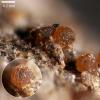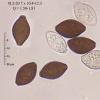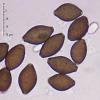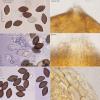
28-02-2026 14:43
A new refrence desired :Svanidze, T.V. (1984) Novy

01-03-2026 18:46
 Robin Isaksson
Robin Isaksson
Hi! This species i se from time to time in the

27-02-2026 17:51
 Michel Hairaud
Michel Hairaud
Bonjour, Quelqu'un peut il me donner un conseil p

27-02-2026 16:17
 Mathias Hass
Mathias Hass
Hi, Found this on Betula, rather fresh fallen twi

01-03-2026 18:02
 Francois Guay
Francois Guay
I found this mystery Helotiales on an incubated le

01-03-2026 14:10
 Antonio Couceiro
Antonio Couceiro
Hola, me gustaria conocer opiniones sobre este tem
These small (0.3-0.4 mm) orange perithecia grew on incubated rabitt dung for one month. They seem to be ostiolate because there is a crown of hyaline setae around the very inconspicuous, not protruding, neck. Perithecial walls are more o less glabrous. Asci clavate. Ascospores citriform, biporate with smooth walls.
According to GARCIA & al. (STUDIES IN MYCOLOGY 50: 63–68. 2004) the genus Sphaerodes currently comprise species characterized by non-ostiolate ascomata (if they are ostiolate they have a short neck surrounded by a crown of hyaline setae) and reticulate ascospores, umbonate at both ends. So only rest Melanospora as a good choice for my fungus. But I don't know a keyed species that matches with this collection.
Could you help me?
Thanks in advance

Good harvest! Your photos on the neck seems short and with this size can be spores can you look to M.fimbriata?
Michel.
Hi Michel
M. fimbriata is poorly described by Petch (Trans. Brit. Mycol. Soc.) with ELLIPSOID (sic) ascospores. And the somewhat platanoid, not really citriform ascospores drawn by Cannon & Hawksworth (pag. 126) together with the very small perithecia (40-50 microns in diam.) I think don't agree with my collection.
Thanks a lot




